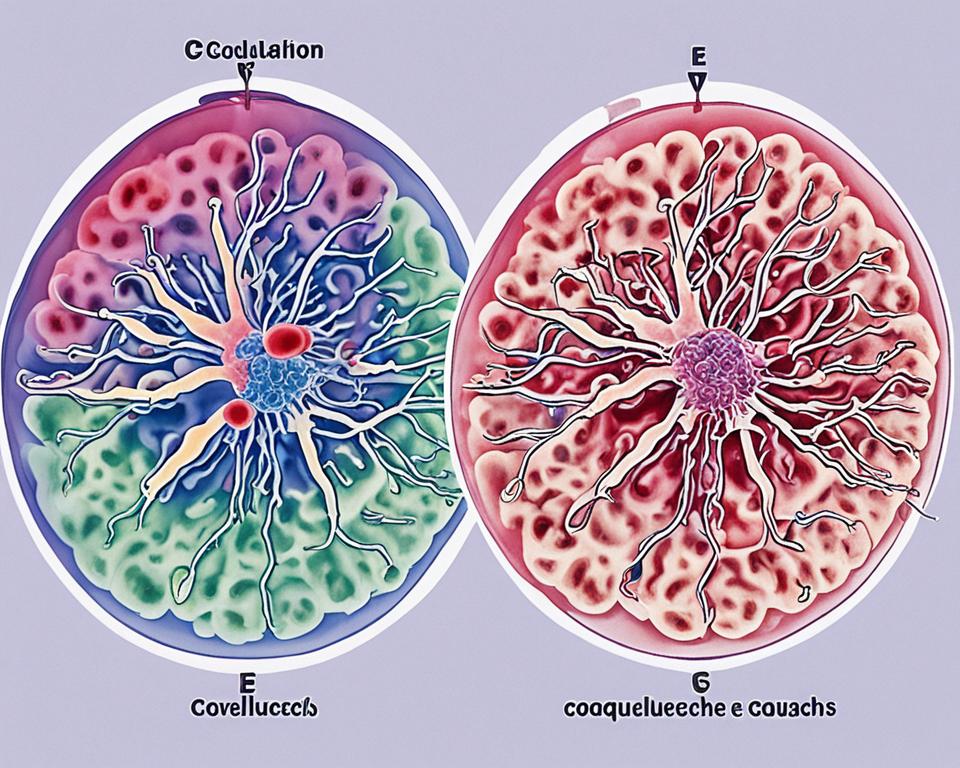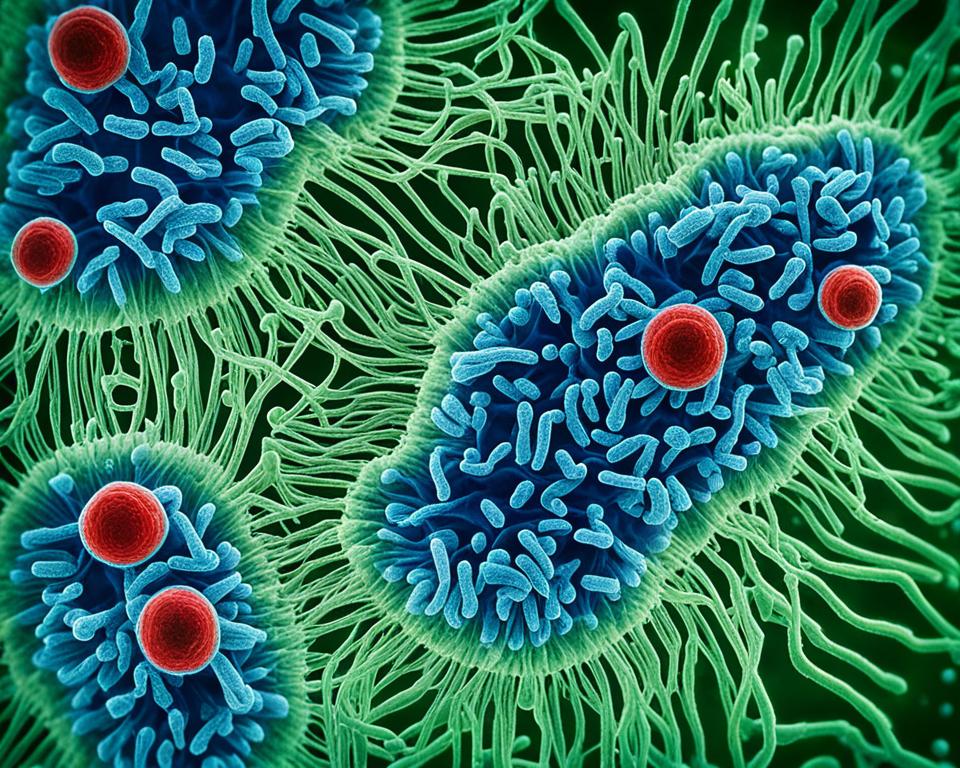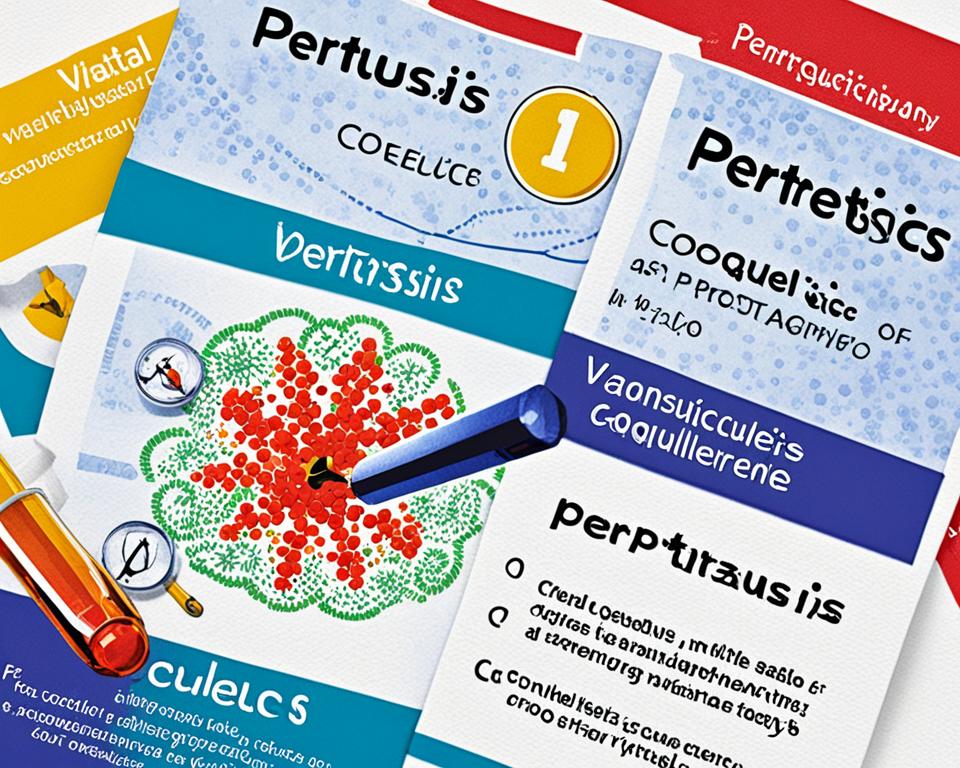
Did you know whooping cough, or pertussis, can spread even if you’re vaccinated? This coqueluche is caused by the Bordetella pertussis bacteria. It leads to weeks or even months of bad coughing fits. These fits are dangerous and can be very long.1
So, what’s coqueluche, and how can we stay safe from it? Let’s learn about the top 5 facts on whooping cough. This will help us understand and protect ourselves from this serious illness.
Table of Contents
ToggleKey Takeaways
- Whooping cough, or coqueluche in English, is a highly contagious, vaccine-preventable bacterial disease caused by the Bordetella pertussis bacteria.
- Initial symptoms resemble a common cold, but can progress to severe coughing fits lasting weeks or months, often ending with a characteristic “whoop” sound.
- Whooping cough can lead to serious complications, especially in infants, and can even be life-threatening in some cases.
- Vaccination is the primary method of prevention, with a series of doses recommended during childhood and booster shots for adolescents and adults.
- Outbreaks of whooping cough can still occur in both vaccinated and unvaccinated populations due to waning immunity and bacterial mutations.
Understanding Coqueluche in English
Coqueluche is a French word for whooping cough. It’s a severe respiratory illness.2 Bordetella pertussis bacteria cause it. At first, it feels like a common cold. The patient has a runny nose, fever, and mild cough.2
After a few weeks, the cough got worse. There are rapid, uncontrollable coughing fits. They often end with a whooping sound as the person catches their breath.2
These bouts of coughing can be so intense that they cause vomiting, fatigue, and they might even break the person’s ribs.2 Young children might not make the whooping sound. Instead, they struggle to breathe or may even stop for a moment.
What is Coqueluche?
Coqueluche comes from the French word for whooping cough. It’s also known as pertussis in English.2 Originally, it came from the Italian word “coccolucio.” This Italian word itself was from the Latin “cucullus,” which means “hood.”2
In French, “coqueluche” is a broad term. It can refer to whooping cough, the flu, a craze, an idol, or even a hood. So, the French use it to mean different things.2
Coqueluche in English: Whooping Cough
Whooping cough is the English name for coqueluche. In the Norman dialect of Jersey, coqueluche means whooping cough or a type of sea snail called the whelk.2 The Portuguese word “coqueluche” started being used in 1840. In Brazil, it’s pronounced /ko.keˈlu.ʃi/ and in Portugal, /kɔ.kɨˈlu.ʃɨ/.2
It can also mean a craze or a fad. This is when something new becomes very popular for a short time. People all of a sudden really like it.2
Symptoms of Whooping Cough
Whooping cough shows through severe and long coughing fits. They end with a whooping sound as the person breathes in.2 These bouts of coughing can be very hard on the body.
They might cause vomiting, make the person very tired, or even break their ribs.2 For small children, there might not be a whooping sound. Instead, they might struggle to breathe or seem to stop breathing for a moment.
Causes and Transmission of Whooping Cough
Whooping cough, known as pertussis, comes from the Bordetella pertussis bacteria.3 It spreads mostly through the air. It moves when infected people cough or sneeze.
When you breathe in these bacteria, they stick to your respiratory tract. There, they start to multiply. They produce toxins that hurt your airways and make it hard to clear out mucus.
Bordetella Pertussis Bacteria
Bordetella pertussis causes whooping cough. It’s a respiratory disease that brings on deep, hard coughs. These bacteria love to live in your upper respiratory tract.
There, they release toxins. These toxins can cause the “whoop” sound when you cough.
How Whooping Cough Spreads
Whooping cough is very contagious. It mostly spreads through the air.4 Someone with the disease can spread it from the moment they get symptoms. This is still possible up to about 3 weeks of intense coughing.
It can spread fast, especially in crowded places. This is why it’s a big concern for public health, especially if people are not vaccinated.

Diagnosing Coqueluche in English
To diagnose whooping cough, doctors use a mix of clinical check-ups and lab tests. They look at the patient’s symptoms very closely.3 They search for the big, rough coughs, the “whooping” sounds, and other key signs.3
Clinical Evaluation
Checking the patient’s symptoms is really important. Doctors pay special attention to the tough coughs that go on for weeks or months.3 They’re particularly on the lookout for the “whoop” sound that follows a coughing fit.3 It can be a clear clue that it’s whooping cough.
Laboratory Tests
Alongside the check-ups, tests from labs can also show if it’s whooping cough. They use a swab from the nose and throat for two main tests.3 They may also check how many antibodies are fighting the illness.
This is more common several weeks into the sickness.3 Yet, confirming with lab results can be tough if it’s been more than a few weeks since symptoms showed.

| Test | Description | Advantages | Limitations |
|---|---|---|---|
| Nasopharyngeal Swab | Culture and PCR testing to detect Bordetella pertussis bacteria | Highly specific, can identify the causative agent | Bacteria is only present in early stages of illness, low sensitivity |
| Serological Tests | Measure antibody levels to confirm pertussis infection | Can be used later in the illness course | Antibody levels may be low in vaccinated individuals |
Treatment Options for Whooping Cough
Antibiotics for Whooping Cough
The main way to treat4 whooping cough is with antibiotics. Doctors use erythromycin, azithromycin, or clarithromycin.5 These drugs help make the illness less severe if you take them early, like within the first 3 weeks.5 But, they might not work as well if the coughing gets really bad.
Supportive Care for Severe Cases
Severe cases, especially in4 infants, need extra care. This is done in a hospital.5 Treatment might include oxygen, IV fluids, and watching for things like pneumonia and seizures.4 While whooping cough isn’t often deadly, it can be for young babies with serious problems.
| Antibiotic Therapy | Supportive Care |
|---|---|
|
|
| Reduces symptom severity and duration when taken early | Crucial for severe cases, especially in infants |
5 Antibiotics are important for treating whooping cough. Doctors might also give them to family members who were around the sick person.5 Cough medicines from the store don’t work well for this illness. So, it’s best not to use them.
6 Whooping cough can cause serious problems for babies, like pneumonia or seizures. In some cases, it can even lead to death.6 If the illness is really bad, the baby might need to go to the hospital for close care or intensive care.
Coqueluche in English: Prevention and Vaccination
The best way to stop whooping cough is through vaccination. The pertussis vaccine is part of the DTaP series. It should be given at 2, 4, 6, and 15-18 months, plus 4-6 years old.3 This schedule protects children at their most vulnerable times.
Childhood Vaccination Schedule
The vaccine schedule for whooping cough aims for full protection. It includes several doses in a child’s early years.3 This way, children get immunized before they might catch Bordetella pertussis.
Booster Shots for Adolescents and Adults
Vaccination in childhood helps a lot. But immunity can go down over time. So, it’s important for adolescents and adults to get booster shots against whooping cough.3 At 11 years old, they’re advised to get boosters for pertussis, diphtheria, and tetanus.
Vaccination During Pregnancy
Maternal vaccinations help protect infants in their first months of life.3 Pregnant women should get the whooping cough vaccine between 27 to 36 weeks. This boosts the baby’s defense, cutting the risk of serious sickness.
Vaccination is very effective. Yet, sometimes, whooping cough can still spread, even in vaccinated groups. This can happen due to waning immunity and changes in the bacteria.34 That’s why it’s key to keep up with research and make sure vaccines work well to guard against this illness.

Complications of Whooping Cough
Whooping cough, also known as pertussis, can cause serious issues, especially for young children. It may lead to pneumonia, seizures, and brain damage due to lack of oxygen.
Other problems, like dehydration, rib fractures, hernias, and times when breathing stops, are possible.3 Babies under a year are most at risk. About half of them might need hospital care. Sadly, almost 0.5% of these babies could die from the disease.3
Older kids and adults could face less critical but still problematic concerns. These include vomiting, feeling extremely tired, and bursting capillaries under the skin.4 Getting quick treatment and support is key. It helps control the symptoms and avoids the worst outcomes.
High-Risk Groups for Severe Whooping Cough
Whooping cough can be especially dangerous for certain people. This includes infants under 6 months old who haven’t finished their shots. These babies often have not built up immunity and face the greatest risk.3
Unvaccinated people of all ages are in danger as well. They miss out on the protection the vaccine offers.4 Places with low vaccine rates see more outbreaks.
Pregnant women and those with weak immune systems should get preventive drugs if they might have been exposed.
Infants and Young Children
Thanks to not being vaccinated, infants under 6 months old can get very sick from whooping cough. In fact, they’re at the greatest risk.3
They can get serious problems like brain damage or pneumonia. Even breathing trouble is possible in babies under a year old.4
Children under 1 year old who catch whooping cough need close watching. Their coughs might cause them to stop breathing, which is very dangerous.4
Unvaccinated Individuals
Not getting the whooping cough vaccine puts you at risk, no matter how old you are.4 Kids and adults alike are vulnerable, especially as time weakens the vaccine’s effect.4
Adults can get the vaccine at any age. It’s important that they then stay updated with booster shots. A health-threatening injury may require you to get the vaccine early.4
Conclusion
In short, coqueluche, known as whooping cough or pertussis, is very catchy and caused by the Bordetella pertussis bacteria.7 Over 200,000 cases yearly were seen in the US before the 1940s vaccine came out.7 After the vaccine, cases dropped by more than 75% percent.
But whooping cough is still a big worry. It makes people sick, even if they’ve been vaccinated.8
Quick diagnosis, giving the right antibiotics, and making sure people get the vaccine are key in stopping this dangerous disease.7 From 2000 to 2017, pneumonia showed up in 13.2% whooping cough cases and in 18.6% babies under 6 months.7 It’s important to keep learning and teaching others to fight whooping cough. A lot of kids under 5 got sick in 2014, and sadly, many died.
Vaccination is super important. It’s still the best way to not get and spread whooping cough.8 We must be fast in diagnosing, giving the right care, and making sure many get vaccinated. This is how we can help stop whooping cough from hurting people, especially babies.7,8
FAQ
What is coqueluche in English?
Coqueluche means whooping cough, a respiratory disease. This illness is very contagious. It is caused by the Bordetella pertussis bacteria.
What are the symptoms of whooping cough?
At first, it felt like a cold. You might have a runny nose, fever, and mild cough. But soon, the cough gets worse. It leads to rapid and severe coughing fits, where you might make a “whooping” sound as you breathe in.
How is whooping cough spread?
The virus spreads through the air. When someone coughs or sneezes, they release it. The bacteria sticks to the throat and damages the airways. This makes it hard to clear mucus.
How is whooping cough diagnosed?
Doctors will check your symptoms and perform lab tests to diagnose whooping cough. They take a sample from the back of your nose to look for the Bordetella pertussis bacteria. This sample is tested using culture or PCR methods.
How is whooping cough treated?
Treating whooping cough involves taking antibiotics. Erythromycin, azithromycin, or clarithromycin can help. They make the symptoms less severe if you start treatment early.
In severe cases, you may need hospital care. This can include helping with breathing, IV fluids, and managing any complications.
How can whooping cough be prevented?
The best way to stop whooping cough is through vaccination. The DTaP vaccine prevents it. Children and adults need shots. Pregnant women should get the vaccine too. This helps protect babies.
What are the complications of whooping cough?
Whooping cough has severe risks for some. Babies, unvaccinated people, and those with weak immune systems are especially at risk. Complications can include pneumonia, seizures, and brain damage from lack of oxygen.
Who is at the highest risk for severe whooping cough?
Infants under 6 months old face the highest risk. This is especially true if they have not had the full vaccine series. Unvaccinated people and those with weak immune systems are also at greater risk. Pregnant women must also be careful.
Source Links
- https://www.ecdc.europa.eu/en/pertussis/facts
- https://en.wiktionary.org/wiki/coqueluche
- https://www.mayoclinic.org/diseases-conditions/whooping-cough/symptoms-causes/syc-20378973
- https://www.webmd.com/children/whooping-cough-symptoms-treatment
- https://www.mayoclinic.org/diseases-conditions/whooping-cough/diagnosis-treatment/drc-20378978
- https://www.ncbi.nlm.nih.gov/pmc/articles/PMC7154224/
- https://www.cdc.gov/vaccines/pubs/pinkbook/pert.html
- https://www.ncbi.nlm.nih.gov/pmc/articles/PMC6649206/
